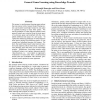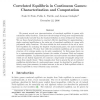168 search results - page 13 / 34 » Matching as a non-cooperative game |
115
Voted
JANCL
2007
15 years 1 months ago
2007
ABSTRACT. This paper provides a complete characterization of epistemic models in which distributed knowledge complies with the principle of full communication [HOE 99, GER 99]. It ...
127
click to vote
STOC
2006
ACM
16 years 2 months ago
2006
ACM
Unique games are constraint satisfaction problems that can be viewed as a generalization of Max-Cut to a larger domain size. The Unique Games Conjecture states that it is hard to ...
88
Voted
CHI
2010
ACM
15 years 8 months ago
2010
ACM
Collection recommender systems suggest groups of items that work well as a whole. The interaction effects between items is an important consideration, but the vast space of possib...
120
click to vote
IJCAI
2007
15 years 3 months ago
2007
We present a reinforcement learning game player that can interact with a General Game Playing system and transfer knowledge learned in one game to expedite learning in many other ...
143
click to vote
CORR
2008
Springer
15 years 2 months ago
2008
Springer
We present several new characterizations of correlated equilibria in games with continuous utility functions. These have the advantage of being more computationally and analytical...


